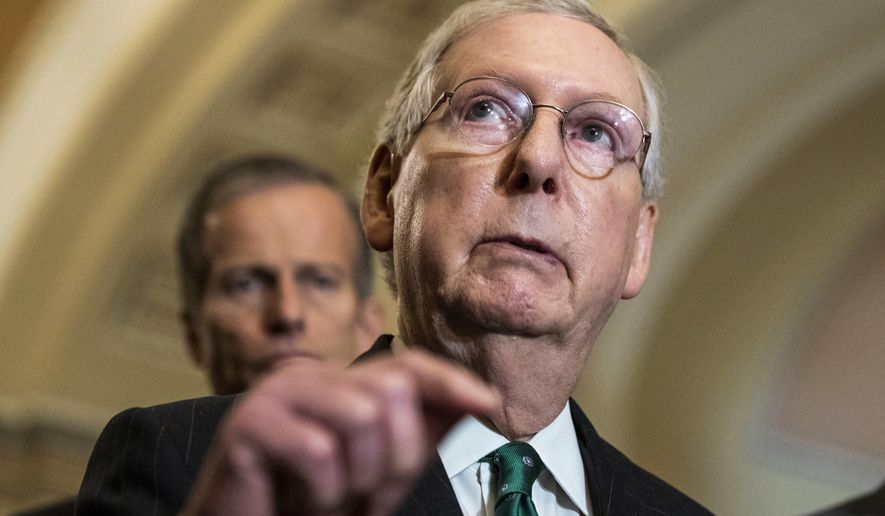WASHINGTON (AP) - With the GOP tax plan contributing to rising federal deficits, Democrats are warning that Republicans will seek cuts to Medicare, Medicaid and Social Security to balance budgets if they keep control of Congress in the November election.
It’s a familiar message for Democrats, who have for years campaigned on the idea that Republicans want to gut the “entitlement” programs. Republicans say they want to put those benefit programs on better financial footing and tame the deficit.
Senate Majority Leader Mitch McConnell fueled the campaign attack when he said this week that entitlement spending, not the Republican tax plan, is responsible for the increasing deficits that are now on track to top $1 trillion - a level unseen since the aftermath of the Great Recession.
“This is the exact Republican playbook we’ve seen time after time,” said Rep. John Yarmuth, a Kentucky Democrat who’s in line to become Budget Committee chairman if Democrats win control of the House. He spoke on a Democratic conference call Wednesday with reporters.
Republicans promised their $1.5 trillion tax law - which was supposed to spur economic growth by cutting individual and corporate rates - would pay for itself. But with federal revenues lagging and deficits climbing, McConnell said the problem is the entitlement spending that accounts for most of the federal government outlays.
“It’s disappointing, but it’s not a Republican problem,” McConnell said in a Tuesday interview with Bloomberg News. “It’s a bipartisan problem: unwillingness to address the real drivers of the debt by doing anything to adjust those programs to the demographics of America in the future.”
Democrats seized on McConnell’s comments as a sign Republicans will put entitlements on the chopping block.
Rep. Cheri Bustos of Illinois, a co-chair of the Democratic policy committee, said McConnell is like a “thief” caught in mid-act but denying responsibility for the situation. She said he “showed his hand.”
As Democrats sought the political high ground, President Donald Trump stepped into the fiscal debate on Wednesday by urging members of his administration to cut back on their spending in the next fiscal year. Dubbing it the “nickel plan,” Trump said he’s asking every Cabinet secretary to cut their budget request by 5 percent.
Yet cuts of that magnitude would do little to stem the nation’s red ink. The president has also proposed steep cuts in previous budgets, only to have them ignored by Congress.
McConnell, meanwhile, has given little indication that entitlement reform is on his to-do list for the next Congress. Republicans have a good chance of retaining the Senate majority in the election, but control of the House is uncertain.
In fact, McConnell has largely shied from the kind of big-ticket reforms the House has passed, including Speaker Paul Ryan’s proposals to revamp Medicare into a voucher-like program and make steep cuts to Medicaid. Republican senators have been less supportive of those plans.
Changing entitlement programs would be a heavy lift for Congress. Lawmakers debated several proposals during President Barack Obama’s tenure, including changes to Social Security, only to have the effort collapse in failure after months of negotiations.
Democrats, though, heard enough in McConnell’s comments to sound the alarm as they battle for control of Congress in November.
“This is the classic Republican bait and switch,” said Sen. Chris Van Hollen of Maryland, who chairs the Senate Democrats’ campaign committee.
“All of our candidates will be zeroing in on this issue,” he said. “I’m sure all of our candidates will be letting voters know.”
The Treasury Department reported this week that deficits climbed to $779 billion in fiscal 2018, which ended last month, and are on track to top $1 trillion next year under President Donald Trump, a level not seen since 2012.
At that time, revenues were plunging because of the economic downturn and the government was spending more to counter the crisis, including through Obama’s stimulus law.
Now, Treasury says revenues are not keeping pace with spending. The tax cuts Trump signed into law last year slashed rates for corporations, the wealthy and many middle- and lower-income families. Meanwhile, government spending continues to grow, in large part on health care outlays with the aging population.
While the tax cuts did spur economic growth, they have not yet generated enough to fully offset the lost revenue. Many Republicans predicted the tax law would pay for itself.
Yarmuth noted that the Trump’s tax returns - and the amount of taxes the Trump family contributes to the federal government - would be something the Democrats would be interested in looking into if they take control of the House.
___
Follow on Twitter at https://twitter.com/lisamascaro




Please read our comment policy before commenting.